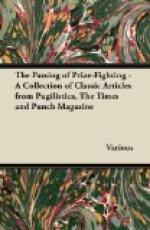No part of England is immune
From frost and thunder-storms in June.
Only the suicide lays by
His thickest hose throughout July.
August, in spite of dog-days’ heat,
For floods is very hard to beat.
The equinoctial gales, remember,
Are at their worst in mid-September.
Old folk, however hale and sober,
Die very freely in October.
November with its clammy fogs
The bronchial region chokes and clogs.
December, with its dearth of sun,
For sheer discomfort takes the bun.
* * * * *
THE ITALIAN IN ENGLAND.
In the course of a recent search for Italian conversation manuals I came upon one which put so strangely novel a complexion on our own tongue that, though it was not quite what I was seeking, I bought it. To see ourselves as others see us may be a difficult operation, but to hear ourselves as others hear us is by this little book made quite easy. Everyone knows the old story of the Italian who entered an East-bound omnibus in the Strand and asked to be put down at Kay-ahp-see-day. Well, this book should prevent him from doing it again.
But its great attraction is the courageous personality of the protagonist as revealed by his various remarks. For example, most of us who are not linguists confine our conversations in foreign places to the necessities of life, rarely leaving the beaten track of bread and butter, knives and forks, the times of trains, cab fares, the way to the station, the way to the post-office, hotel prices and washing lists. And even then we disdain or flee from syntax. But this conversationalist embroiders and dilates. He is intrepid. He has no reluctances. Where we in Italy would, at the most, say to the cameriere, “Portaci una tazza di caffe,” and think ourselves lucky to get it, he lures the London waiter to invite a disquistion on the precious berry. Thus, he begins: “Coffi is rI-marchebl for iZ verE stim-iuletin propeRtE. Du ju no hau it uos discovvaRd?” The waiter very promptly and properly saying, “No, Sor,” the Italian unloads as follows: “Uel, ai uil tel ju thet iZ discovvare is sed tu hev bin ochesciont bai thi folloin sorcomstanZ. Som gotS, hu brauS-t op-on thi plent from huicc thi coffi sids aR gathaRd, ueaR observ-D bai thi gothaRds tu bi echsidinglE uechful, end ofn tu chepaR ebaut in thi nait; thi praioR Ov e nebArin monnastErE, uiscin tu chip his monchs euech et theaR mat-tins, traid if thi coffi ud prodiuS thi sem effecht op-on them, es it uos observ-D tu du op-on thi gotS; thi soch-ses ov his echsperiment led tu thi appresciescion ov iZ valliu.”
A little later a London bookseller has the temerity to place some of the latest fiction before our chatty alien, but pays dearly for his rash act. In these words did the Italian let him have it:—“Ai du not laich nov-els et ol, bico-S e nov-el is bat e fichtiscios tel stof-T ov so menE fantastical dids end nonsensical worDs, huicc opset maind end haRt. An-heppe tho-S an-uerE jongh persons, hu spend theaR pre-scios taim in ridin nov-els! The du not no thet nov-ellists, gennerallE spichin, aR thi laitest end thi most huim-sical raittaRs, hu hev uested end uest theaR laif in liudnes.”




